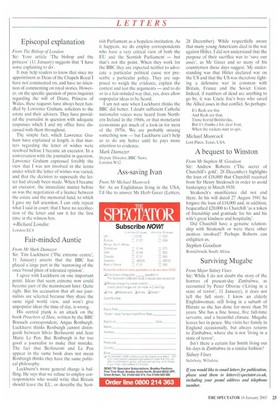Fair-minded Auntie
From Mr Mark Damazer Sir: Tim Luckhurst (`The extreme centre', 11 January) asserts that the BBC has played a large part in the 'narrowing of the once broad plain of tolerated opinion'.
I agree with Luckhurst on one important point. Ideas that seem extreme now could become part of the mainstream later. Quite right. But his accusation that all our journalists are selected because they share the same rigid world view, and won't give unpopular ideas the time of day, is wrong.
His central plank is an attack on the hook Preachers of Hate, written by the BBC Brussels correspondent, Angus Roxburgh. Luckhurst thinks Roxburgh cannot distinguish between Silvio Berlusconi and Jean Marie Le Pen, But Roxburgh is far too good a journalist to make that mistake. The fact that Berlusconi and Le Pen appear in the same book does not mean Roxburgh thinks they have the same political philosophy.
Luckhurst's more general charge is baffling. He says that we refuse to employ correspondents who would write that Britain should leave the Eli, or describe the Scot
tish Parliament as a hopeless institution, As it happens, we do employ correspondents who have a very critical view of both the EU and the Scottish Parliament — but that's not the point. When they work for the BBC they are expected neither to advocate a particular political cause nor prescribe a particular policy. They are supposed to weigh the evidence, explain the context and test the arguments — and to do so in a fair-minded way that, yes, does allow unpopular ideas to be heard.
I am not sure when Luckhurst thinks the BBC did better. I doubt sufficient Catholic nationalist voices were heard from Northern Ireland in the 1960s, or that monetarist economists got much of a look-in for most of the 1970s. We are probably missing something now — but Luckhurst can't help us to do any better until he pays more attention to evidence.
Mark Damazer
Deputy Director, BBC News, London W12


























































 Previous page
Previous page